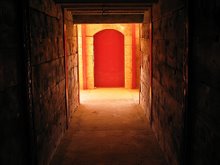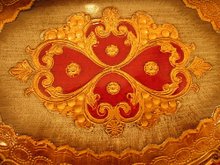Dachau. What do you write about a place carved forever into history for the evils which took place there? The silence of its sterile halls speaks volumes more than my feeble words can. Yet I feel compelled to write something, if only to give myself a chance to digest it all.
 Dachau was the first concen- tration camp created by the Nazis, in 1932. From the moment you walk through the heavy iron gates, mockingly marked with "Arbeit Macht Frei" ("Work will set you free") and hear them groan as they close behind you, you feel the weight of this place crashing down on you like the iron chains that hold prisoners behind walls of concrete for years as their lives drain away.
Dachau was the first concen- tration camp created by the Nazis, in 1932. From the moment you walk through the heavy iron gates, mockingly marked with "Arbeit Macht Frei" ("Work will set you free") and hear them groan as they close behind you, you feel the weight of this place crashing down on you like the iron chains that hold prisoners behind walls of concrete for years as their lives drain away.This was the same gate that every prisoner who arrived at Dachau entered through, leaving behind their earthly possessions -- even the clothes on their backs, their identity, their individuality, and their dignity. Everything that could be taken was taken from them, and when they stepped through to the other side, their names were never spoken again, except in whipsers, among friends, among survivors. To the Nazis, they were but a number. A number that they wanted to simply erase.
 I learned that Dachau was created as a "slave labor camp," where political prisoners -- anyone who resisted the absolute suppression of freedom as defined by Adolf Hitler -- were worked to the point of death, as opposed to being gassed or gunned down en masses, at at death camps such as Auschwitz and Treblinka. Political radicals, priests, homosexuals, and most certainly Jews were detained here until the liberation of the camp in spring 1945. Dachau was designed to include gas chambers, posing innocently as shower halls, and they were built here. But for reasons uncertain to many, these chambers were never used.
I learned that Dachau was created as a "slave labor camp," where political prisoners -- anyone who resisted the absolute suppression of freedom as defined by Adolf Hitler -- were worked to the point of death, as opposed to being gassed or gunned down en masses, at at death camps such as Auschwitz and Treblinka. Political radicals, priests, homosexuals, and most certainly Jews were detained here until the liberation of the camp in spring 1945. Dachau was designed to include gas chambers, posing innocently as shower halls, and they were built here. But for reasons uncertain to many, these chambers were never used. What is clear is that during their years of captivity, the Jewish prisoners were given the hardest, most grueling work, fed the smallest, most worthless rations of food, treated with the harshest, most unrelentless punishment, and assigned to the poorest, most inhumane living quarters. What kept the survivors alive -- what enabled them to push past starvation, exhaustion, physical beatings, illnesses, even an outbreak of deadly typhus (which killed thousands, including Anne Frank and her sister Margot), was the power of their hearts.
What is clear is that during their years of captivity, the Jewish prisoners were given the hardest, most grueling work, fed the smallest, most worthless rations of food, treated with the harshest, most unrelentless punishment, and assigned to the poorest, most inhumane living quarters. What kept the survivors alive -- what enabled them to push past starvation, exhaustion, physical beatings, illnesses, even an outbreak of deadly typhus (which killed thousands, including Anne Frank and her sister Margot), was the power of their hearts.Thrust into an environment where man cared only for himself -- where daily, armed officers kicked and beat and defamed these people whose only crime was their faith -- still, they watched out for each other, sharing their meager rations, singing and praying together in private, caring for their sick and wounded, even initiating newcomers by teaching them the rules of the camp. Despite the absolute worst of circumstances, many lived to see the day of iberation, and then went on to rebuild their entire lives.
 I stood in the barracks where starved-thin bodies were crammed head-to-toe, celing to floor, for months on end. The barracks, designed to hold 200 prisoners each, were holding nearly three times that amount when the Allied Forces found them. I walked through the crematorium where bodies of the dead were reduced to bones and ash in an effort to hide from the world´s eye the true purpose of this prison. Though, when the liberators arrived, the found piles of rotting corpses stacked near the crematorium and other bodies half-burned, as the Nazis had run out of fuel when their supplies and funds began dwindling towards the war´s end.
I stood in the barracks where starved-thin bodies were crammed head-to-toe, celing to floor, for months on end. The barracks, designed to hold 200 prisoners each, were holding nearly three times that amount when the Allied Forces found them. I walked through the crematorium where bodies of the dead were reduced to bones and ash in an effort to hide from the world´s eye the true purpose of this prison. Though, when the liberators arrived, the found piles of rotting corpses stacked near the crematorium and other bodies half-burned, as the Nazis had run out of fuel when their supplies and funds began dwindling towards the war´s end.A wrought-iron sculpture stands today near the main hall, its silhouette of twisted barbs and torqued skeletons a sharp visual reminder of the turmoil and torture that took place here and of the lives lost that we must never forget. It is places like this that bring realism, purpose, reflection, solidity to the larger experience that for so many travelers to this region is simply a vacation from the daily grind of life. Here in this place, behind this gate, we are all reminded that our very existance borders on the sacred. The thousands who breathed their last breath here would tell you the same, if they could. Or maybe they are.
~Melanie









No comments:
Post a Comment